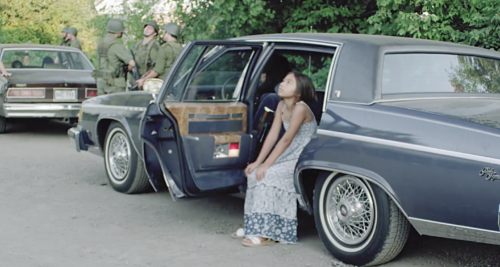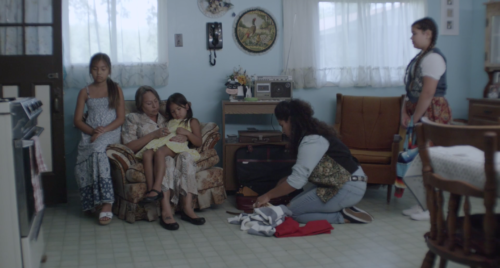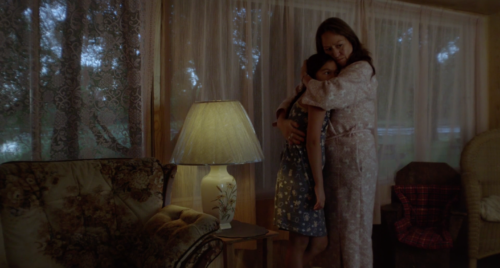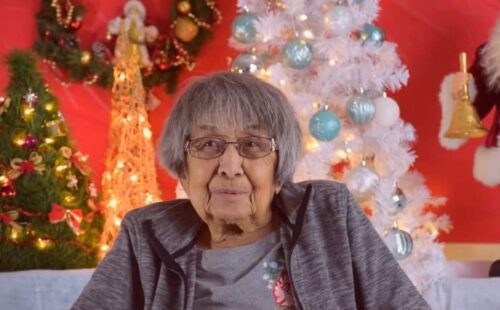An interview with Roxann Karonhiarokwas Whitebean
[Editorial note: Montréal Serai editor Jody Freeman interviewed Roxann Karonhiarokwas Whitebean in mid-May 2021, before the heart-rending discoveries of the unmarked graves of 1,148 children on the sites of former Indian residential schools.]
Jody: Roxann Karonhiarokwas, I would first like to welcome you on behalf of Montréal Serai and say how happy I am to meet you. I know I didn’t pronounce your Mohawk name properly. Would you mind telling me how to say it? Does it have a special meaning?
Roxann: Karonhiarokwas. It means “She cleans the sky.”
Jody: Despite the fact that you’re in your 30s, you already have a lot under your belt. And you’ve also had to face extremely difficult situations, even at a very young age – experiences including the 1990 Oka resistance (Oka crisis). You must have been a young child when that happened in Oka.
Roxann: Yes, I was six years old. I feel like I grew up very quickly during that time. I remember almost everything because it was so traumatizing, especially the day the tanks first rolled into Kahnawà:ke. It’s definitely something that shaped me as a person and had a really profound impact on my childhood and on who I became as a woman, as an adult moving forward in my life. Some of my family members are in the Rocks at Whisky Trench documentary (about the Oka crisis), which was directed by Alanis Obomsawin. We were very much involved, my family.
Jody: The first film that you made, Legend of the Storm, also reflects those experiences. Did your dreams and your nightmares play into your decision to make that film?
Roxann: I decided to make that film after my daughter came home from school one day – she must have been around six or seven years old – and said, “Did you know there was a war in Kahnawà:ke, a couple of hundred years ago?” I asked her what war she was talking about. She said, “Well, they blocked the Mercier Bridge and the army came in, fighting about land.” When I told her I was a little girl when it happened, she couldn’t believe it. She said, “What did you do and what did you think and how did you feel?”
It was very cathartic for me to write out the poetic allegory that inspired the film Legend of the Storm. I applied for a very small Canada Council for the Arts grant for emerging artists: $20,000. I managed to get the film done and took a very artistic approach to it, using a really old lens. I knew that I couldn’t really compete against mainstream artists at that point. But it was an emotional film and it was an opportunity for us to tell our story.
The actors in the film are not trained actors. They are the descendants of the survivors of the crisis, or are survivors themselves. Some were children when that took place. The grandparents in the film were actually there and were young adults at the time. We really pulled together to just make something special. That was my very first film.
Jody: At the end of that film, you also had some bad news personally, I think.
Roxann: Before I started shooting Legend of the Storm, I discovered a growth in my right breast and I did some research on breast cancer. About five or six years prior to that, I had gone to the CLSC (community health clinic) and asked the doctor to give me a breast examination. She thought I was too young and dismissed my concern. It turned out that the growth actually was breast cancer – advanced-stage breast cancer – and it had spread. I had several tumours, but fortunately the cancer didn’t reach my lymph nodes. I started treatment almost immediately.
We were editing Legend of the Storm while I was doing active treatment and we were simultaneously filming Thunder Blanket. It was a very overwhelming time. I didn’t think I was going to survive this breast cancer. With Thunder Blanket, I wanted to raise awareness about giving ourselves breast examinations from the time we’re 18, because my doctor told me his youngest patient was 16 years old. Imagine being 16 years old, just coming into womanhood and then discovering that you have breast cancer and need a double mastectomy. I’m grateful that I was able to live a good portion of my life before I had to deal with this.
Jody: You also went to see a medicine person named Bill Constant. Was he in Québec?
Roxann: No, he was in northern Ontario, but he is originally from Manitoba. I met him through mutual friends, like sun dancers and people who believe in our traditional system of governance and actively live the culture and practice ceremonies. It was a very difficult decision for me to agree to do Western therapy, because I grew up traditionally within the Longhouse with my culture. My parents encouraged me to do chemotherapy. For me, the biggest concern was, “How am I going to take care of my children while I’m doing chemotherapy? What are going to be the side effects?”
I was thinking that I would end up very frail and fragile, but they had me taking steroids by needles and in my stomach, and I ended up gaining 40 pounds and losing all my hair. By the time I got to the film festival, I had been off chemo for a little bit and my hair was really short. It was very humbling for me to have to go out in public and stand on a stage and speak to people, and have that be their first impression of me. It was actually very traumatic, so I tend to bury that experience.
I’m still followed by my oncologist. I had several relapses after Thunder Blanket – several operations and radiation, you know. But it’s been two and a half years now, knock on wood… I’m cancer free.
Jody: While you were going through all of that, didn’t you also form your indie company, Whitebean Media Arts? And you have your four kids, too.
Roxann: Yes, I had no choice, because when I landed the Thunder Blanket gig, I had to create an incorporated company, and I was so green. I had to do research, and by trial and error, I opened up my indie company and started getting small-scale gigs for the CBC (Canadian Broadcasting Corporation) digital platform, which was really a stepping stone to help me land my first feature documentary and then work on larger-scale shows like SKINdigenous, and Raven’s Quest, a kids’ series for TVO (TV Ontario). It’s been a slow and steady process, but I’ve definitely paid my dues.
Jody: And you’re also an activist, no?
Roxann: I don’t really consider myself an activist. I think that when you’re an Indigenous person who lives your culture, standing up for your people and the right to be recognized as a sovereign nation is just a way of life. You’ll never hear me say I’m an activist – to me, that’s not what it is. I grew up this way on the reserve. I’m a product of my environment and I don’t consider myself an activist that people can look to, or anything like that.*
Jody: For the last 10 months or so, you’ve been working on a co-creation, Two Horn Circus, right?
Roxann: Yes. I wrote the first draft and the co-creator is Kaniehtiio Horn, who is a Mohawk actress from my community. The film is inspired by a true story set in the 1930s – our family story – about Kaniehtiio’s grandfather and his nephew, who is my cousin on my grandfather’s side. The two boys were both named Joe Horn, and they ran away to the United States. They faked their own deaths and joined a traveling circus to survive life on the run. They stayed away until they reached the age of majority, then came home. Everyone thought they were dead.
Jody: Was this about avoiding residential school?
Roxann: We were hearing different things (about the boys’ reasons for disappearing). One is that they were trying to avoid being sent to a residential school and there was a lot of speculation as to why they really left. Then when the boys returned home, they carried a lot of guilt because of how it affected their families and their parents, and the community as a whole.
The story that I wrote for the film is an hour and 45 minutes long. I hope it can become a television series, because there are so many different things we can cover in it. I had to do extensive research on circus life in the 1930s in the United States, and there was a lot going on historically during that time: the war, the Depression, the women’s rights movement, segregation. But the characters are all fictional. Their whole journey at the circus is something that we created, and I had a lot of fun doing it.
Jody: What was it like being part of Five in Focus?
Roxann: Five in Focus: Women in View changed my life. Participating in Women in View was amazing. I met other women who are really pushing forward in their careers. I had a great mentor, Danis Goulet, who was a consulting producer for Trickster. And my script mentor, Morwyn Brebner, is the showrunner for the CBC television series Coroner. I had a chance to work with these amazing, wonderful women who were very supportive. Aside from that, I was able to build a bit of a relationship with Jan Miller, who is a great connector, and to participate in the master classes.
I’m thankful for Women in View. The whole point in creating this program is to help Indigenous artists and women develop their projects, get their foot in the door and get their project out there. I’m very grateful for this opportunity. Very, very grateful.
Jody: I’ve been going over the films you’ve made, and it seems like children and elders and traditional people are very much at the centre, at the heart. There is also a very gentle kind of energy and a deep strength that comes with it.
Roxann: Thank you.
Jody: When you’re working, do you find that your chosen medium is similar to oral storytelling? Are there things that link up with that or do you find it’s quite different?
Roxann: My artistic choice and chosen voice is to authentically explore my culture and share that, but also to document our stories with people who are living libraries, because we do come from an oral tradition. I’ve come to realize how important documenting these things are for our future generations… I know it sounds so prophetic or whatever, but I’m really just documenting stories and our history and our experiences – things that I’ve lived through, and things that I believe in as an Indigenous woman – for our future generations.
In my own life, I wish that I could have seen more (Indigenous) content or witnessed my ancestors on screen to know what they were thinking, to get a sense and a feel of the culture, to hear the songs… With some of the material and the content that was created in the past, before Indigenous artists really started coming to the forefront, you could feel that it really wasn’t authentic. Our stories were always told by non-Indigenous people.
I watched television and saw the way we’ve always been portrayed in the media, and I never thought it was fair, especially the way we were talked about during the 1990 Oka crisis. We were always the villains and it was always about “dirty Indians” and “drunken Indians” – and that’s not who we are. Like all cultures, we have people who struggle emotionally. We have people who struggle with addiction issues. But so many of our people are very kind and humble. And we’re coming out of extreme oppression. It was only about 40 years ago that the “Indian agents” left our communities… That’s not a long time.
There is a class system in Canada. We had the residential schools and Indian day schools… we had the 1960s scoop, and now we have the millennium scoop, which is a whole new thing that’s coming into play. And it’s because of systemic racism by the federal government, and the funding that’s given to children on reserve for social services and education. We are dramatically underfunded, as we don’t receive provincial funding for education or social services. Just by being born as an Indigenous child on reserve, we’re born into a disadvantage.
I made that film about Karihwanoron, the Mohawk immersion school, because I was a parent at the school at the time and my children were attending the school. We were very scared that year and unsure if we were going to be able to keep the school open.
Our Mohawk immersion school didn’t receive adequate funding. To keep it going, it was exhausting. On top of our careers, we had to fundraise and attend meetings – it was like a second job. And we still had to be parents. We were still struggling and this was our reality, so I decided to make the film Karihwanoron: Precious Things. I’m very happy I did.
I can’t say that the documentary contributed to or is the reason why this came into being, but the Canadian government started negotiating legislation for the Indigenous Languages Act to support the language. There were a lot of people who wanted this returned to us.
In my family, Mohawk is my mom’s first language. She grew up in a household with her great grandmother. My great grandmother passed away when I was five years old and she didn’t know how to speak English. To me, having so many family members who spoke the language was a very beautiful thing. Our language school is necessary.
Jody: Language and voice are very central in your films… you’re recording elders, what they have to say and also their voices, the way they speak, and everything that’s behind the language, the kind of musicality in how they speak.
Roxann: This is something that I’m very passionate about – sharing our voice with the world, giving our people a platform.
Jody: What new projects are on the horizon for you?
Roxann: I have an exciting project coming up. It’s a half-hour short film called Rose, and it’s funded by Telefilm. It is inspired by my mom’s birth story. There’s a lot of intergenerational trauma in my family. My great grandmother was a residential school survivor, and the trauma just kind of trickled down the line. When they tried to steal my mother and have her adopted out, she was saved by very amazing, strong women in my family. This film is in loving memory of my aunt Nancy – Nancy Diabo – who saved my mother.
In the film, I also want to show how important one child is. If government authorities had removed my mother from her family, I probably wouldn’t exist. But my mother ended up having six kids and 19 grandchildren. The government removed a hundred thousand kids from their families during that time period… so you can only imagine how much was lost.
I want to honour the 1960s scoop survivors and their descendants. Some have reconnected with their families, but there are many 60s scoop victims who still haven’t found their way home, who are still missing and have no idea who they really are. This is why the film is important to me. The work I do is healing for me as an Indigenous woman…
* Please note that audio-video excerpts of the interview were added on July 12, 2021.
2020 Haudenosaunee Canoe Journey (Documentary), a firsthand account of Onondaga knowledge-keeper Hickory Edwards and his 5-year-old daughter, exploring the traditional waterways
2020 Skindigenous (TV series documentary) (2 episodes) on tattoo as an ancient art around the world, with links between today’s tattoo culture and ancient tribal rites
2020 Kahnawake – Skindigenous (Film featuring Kanen’tó:kon Hemlock of the Haudenosaunee Confederacy, who is helping to revive tattooing traditions that were lost as a result of colonization)
2020 – Nimkii – Skindigenous (Film honouring Isaac Murdoch, a respected storyteller and traditional knowledge holder from the Fish Clan, Serpent River First Nation)
2018-2020 Raven’s Quest (TV series) (14 episodes of the series for TVO Kids)
2017 Little Hard Knox (TV series short) profiling 10-year-old boxer, Shatekaienthokwen VanDommelen (“Tugar”) from the Mohawk community of Kahnawake.
2017 Karihwanoron: Precious Things (TV short) about Mohawk language revitalization
2016 Thunder Blanket (TV mini-series short), on the experience of having breast cancer
2015 Legend of the Storm (Short) allegorical film inspired by Roxann’s experience as a child living through the Oka Resistance (Oka Crisis) in 1990
Awards
In 2015, Roxann Karonhiarokwas Whitebean won the Best Drama Pitch Prize at the ImagineNATIVE Film & Media Arts Festival, and was selected by the Whistler Film Festival as an Aboriginal Fellow for her short film, The Paradigm. She is an Alumni of the 2016 Aboriginal Documentary Program with the National Screen Institute. Roxann was a recipient of the REVEAL Indigenous Arts award, and a nominee for the Lindalee Tracey Award for emerging Canadian talent, presented at the Hot Docs International Documentary Film Festival in 2017.
For Roxann Karonhiarokwas Whitebean’s latest projects, please visit Roxann Whitebean Films on Facebook and @RoxannWhitebean on Twitter. Her website will be ready soon.












